Virtual Reality Opens a New Frontier in Reaching Seniors with Alzheimer’s

Virtual reality offers seniors with Alzheimer’s an opportunity to boost memory and enhance quality of life.
Imagine for a minute how it would feel to struggle with the cognitive obstacles of dementia. The people who are closest to you are now unfamiliar. The words and phrases that would roll off your tongue without an additional thought are now just out of reach. In fact, the whole world as you once knew it has completely turned upside down, leaving you yearning for a recognizable foothold.
However, one of the kindnesses imparted by dementia is the long-term memories that frequently remain intact long after short-term memories have disappeared. It’s why connecting seniors with Alzheimer’s to the past is usually a remarkably effective way to engage them – through music, photos, movies, and reminiscing. Now we can add a high-tech tool to the ways we can help seniors mentally connect with the past that is demonstrating remarkable results in older adults with Alzheimer’s disease: virtual reality.
Skip Rizzo, director for medical virtual reality at the USC Institute for Creative Technologies, has been utilizing the technology to aid veterans experiencing PTSD. He is now broadening his reach to seniors – starting with his own 89-year-old mother, whose delightful reaction to a virtual visit to Rome confirmed exactly how impactful the technology can be for older adults.
Rizzo shares an encounter in which he visited a senior living home where a group of residents were just sitting around a table in silence, until he began showing them flashcard-like pictures of objects from the past. The transformation within the atmosphere was electric, as the seniors began sharing memories with one another. With the potential of low-tech tools such as simple photographs to create delight for older adults, imagine the opportunities available to us now with high-tech solutions like virtual reality!
The advantages of virtual reality for older adults go beyond just boosting memory and bringing enjoyment, including:
Improved Medical Care
The distraction of virtual reality is showing to be an effective tool for reducing physical pain for seniors. Additionally, it can be used to improve balance and other motor skills and improve spatial reasoning. It can even help doctors detect health conditions by seeing how seniors respond in different activities and games.
Heightened Socialization
We know that older adult isolation is a contributing aspect in a variety of physical and mental health problems. A recent study conducted by the National Academies of Sciences, Engineering and Medicine announced that up to one in four seniors feel socially isolated. To address this concern, AARP Innovation Labs developed an app called Alcove, in which older adults and their friends and family can enjoy virtual reality experiences together.
Would you like to learn more creative options to improve quality of life for a senior in your life? Reach out to CareWorks Health Services at (949) 859-4700 to find out more about our award-winning home care in Mission Viejo and nearby areas.
